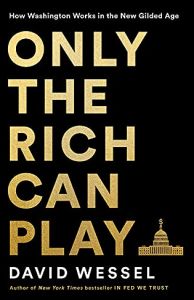Acesse a sua conta getAbstract para obter o resumo!

Acesse a sua conta getAbstract para obter o resumo!
David Wessel
Only the Rich Can Play
How Washington Works in the New Gilded Age
Public Affairs, 2021
Sobre o que é?
A fascinating inside look at D.C. public-interest policymaking – and how it can go wrong.
Recommendation
Pulitzer Prize–winning economics journalist David Wessel brings decades of experience as a Washington reporter to bear on this absorbing account of policy and profit-making in America. Opportunity Zones began as an idealistic effort to put capitalism to work for impoverished communities; not surprisingly, their laudable purpose got lost along the way. In describing the story of Opportunity Zones, from their genesis in a billionaire’s brain to their failure on the ground, Wessel’s writing shines. His inside baseball look at how lawmakers and lobbyists introduce and pass legislation in Washington – including the maneuvering and horse-trading along the way – makes for a fascinating read.
Summary
About the Author
Pulitzer Prize–winning economics journalist David Wessel wrote for The Wall Street Journal for 30 years. He now serves the Brookings Institution as a senior fellow and director of the Hutchins Center on Fiscal and Monetary Policy.




























Comment on this summary